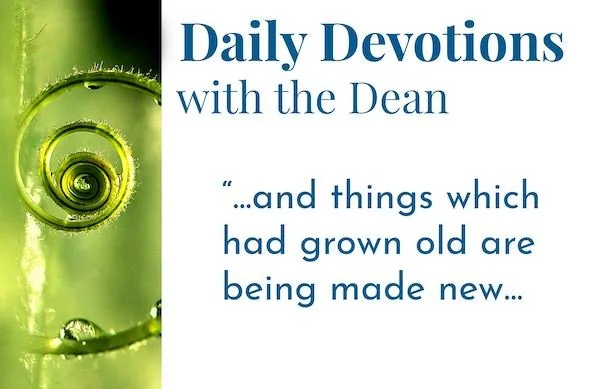Tuesday • 11/28/2023 •
Tuesday of the Twenty-sixth Week After Pentecost (Proper 29)
This morning’s Scriptures are: Psalm 121; Psalm 122; Psalm 123; Nahum 1:1–13; 1 Peter 1:13–25; Matthew 19:13–22
This morning’s Canticles are: following the OT reading, Canticle 13 (“A Song of Praise,” BCP, p. 90); following the Epistle reading, Canticle 18 (“A Song to the Lamb,” Revelation 4:11; 5:9–10, 13, BCP, p. 93)
Welcome to Daily Office Devotions, where every Monday through Friday we draw insights from that day’s Scripture readings, as given in the Book of Common Prayer. I’m Reggie Kidd, and I’m grateful to be with you. This Tuesday in the Season After Pentecost our readings come from Proper 29 of Year 1 in the Daily Office Lectionary.
Today’s brilliant paragraph in 1 Peter leads with an intriguing metaphor: “[G]ird up the loins of your mind” (1 Peter 1:13a). As the editors of the New English Translation note, Peter employs “a figure of speech drawn from the Middle Eastern practice of gathering up long robes around the waist and tucking them under the belt to prepare for work of action.”
I’m reminded of the way my samurai sword class prepares to clean the floors of our dojo at the end of class. We gather the divided skirts of our hakama and tuck them in our belt, so we move about on our knees and hands as we push moistened towels over the floorboards. “Girding your loins” means you are preparing to get to work. When it’s “the loins of our mind” that we are told to “gird,” that can only mean we are supposed to ready ourselves for some hard thinking.
There are too many thought-nuggets in this paragraph to track down in a short devotional. But here are a few.
“[S]et all your hope on the grace that Jesus Christ will bring you when he is revealed” (1 Peter 1:13b). Put hope in the grace that will come when Jesus comes again. It takes a lot of mental energy to sort out the things we can fix or attain in the present from the things that will have to wait for the Lord to fix or bring to us. Tooth decay I can address; my body’s eventual decay I can’t. Proximate justice we can hope for and work towards in society; perfect justice will have to wait. Here’s the Christian hope: all that is wrong now will one day yield to God’s kindness, his benevolence, his unmerited favor. That’s worth thinking hard about.
“[D]o not be conformed to the desires that you formerly had in ignorance” (1 Peter 1:14b). Reflecting on the strong desires that used to govern my life, I’m deluding myself if I think I haven’t been dragged around by them. For Peter, that is pretty much how our former lives were conducted. Ashley Null summarizes the guiding theological insight of Archbishop Cranmer, architect of the Book of Common Prayer (I approximate Null’s formulation), “What the heart desires, the will seizes, and the mind rationalizes.” We are desiring creatures before we are thinking agents. We all have things that are all too powerfully alluring to us. For example, potato chips, chocolate, and ice cream can defeat me. The way I (wrongly) eliminate those temptations when I come across them in the kitchen is to consume them! Peter challenges us to intervene with our brains. We do so by exposing as best we can the secret urges that would otherwise govern us all our days. That’s worth thinking hard about.
“You know that you were ransomed from the futile ways inherited from your ancestors” (1 Peter 2:18). In a similar vein, Peter invites us to reflect on the ways that our upbringing has shaped our sense of right and wrong, truth and falsity. Was our background one of privilege, or not? Were we taught that we were loved and valued, or that we were in the way and that other things matter more? Did we grow up with few friends or many, as an only child or one of many? Did we grow up relating to and valuing all sorts of people, or were we taught to divide the world into “us” versus “them”? Those are things worth thinking hard about.
“‘All flesh is like grass and all its glory like the flower of grass. The grass withers, and the flower falls, 25but the word of the Lord endures forever.’ That word is the good news that was announced to you” (1 Peter 1:24). My mind needs constantly to be reshaped by the truths that are in the Bible. There’s no way around that fact. My friend, the ever-vigilant Paul Kennedy recently discovered this introduction in his hotel room’s Gideon Bible: “Owned, it is riches; studied, it is wisdom; trusted, it is salvation; loved, it is character; and obeyed, it is power.” That’s worth thinking hard about.
Be blessed this day,
Reggie Kidd+













